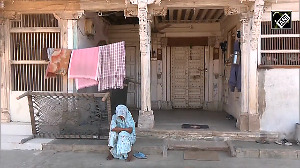The party line is that Washington is the great white hope for democracy everywhere; and that if it is supporting Pakistan -- and its General turned President Pervez Musharraf -- it is doing so only because of the latter's principled stand on the war on terror.
If the recently released 'Nixon Papers' are any indication, however, Washington's pro-Pakistan tilt is as unreasonable as it is enduring.
Official documents relating to the Richard Nixon presidency, now released by George Washington University's National Archives under the US government's historical declassification program, reveal details of how the US went out of its way to help the then Pakistan dictator, General Yahya Khan, despite publicly criticizing his policies.
The documents, which shed light on US policy towards South Asia in general, and the Indian sub-continent in particular, include the infamous 'Blood' telegram from the US Consulate in Dhaka, as also various memos from then National Security Advisor Henry Kissinger to President Nixon, and transcripts of telephone conversations between the two.
The story -- as laid out in the newly declassified papers -- begins with a telegram from the US consulate in Dacca, which says, in part: "Our government has failed to denounce the suppression of democracy. Our government has failed to denounce atrocities. Our government has failed to take forceful measures to protect its citizens, while at the same time bending over backwards to placate the West Pakistan government... Our government has evidenced what many will consider moral bankruptcy..."
Twenty consular officials signed the document, addressed to then National Security Advisor Henry Kissinger. In an addendum, then Consul General Archer Blood says that while he, as the ranking official at the consulate, cannot sign the telegram, he fully endorses the views expressed therein.
"I believe the views of these officers, who are among the finest US officials in East Pakistan, are echoed by the vast majority of the US community, both official and unofficial," says Blood, in the telegram.
In another telegram -- with the ominous words 'Selective Genocide' as subject -- also addressed to the National Security Advisor and dating back to March 1971, Blood is far more descriptive of events in Dacca:
"Here in Dacca we are mute and horrified witnesses to a reign of terror by the Pak military. Evidence continues to mount that the MLA [Martial Law Administrators] authorities have a list of Awami League supporters whom they are systematically eliminating by seeking them out in their homes and shooting them down.
"Among those marked for extinction, in addition to the AL hierarchy, are student leaders and university faculty. In this second category, we have reports that Fazlur Rahman, Head of the Applied Physics Department, Professor Dev, Head of the Philosophy Department and a Hindu, M Abedin, Head of the Department of History, have been killed. Razzak of Political Science Department is rumored dead. Also on list are the bulk of MNAs [Members of the National Assembly] elect and a number of MPAs [Members of the People's Assembly]."
If all this presages the shape of things to come in Kashmir, the next paragraph in the Blood telegram is even more apropos to current events. The Consul General writes: "Moreoever, with support of Pak military, non-Bengali Muslims are systematically attacking poor people's quarters and murdering Bengalis and Hindus..."
Blood goes on to warn that the Administration's policy towards the conflict could boomerang badly. "Full horror of Pak military atrocities will come to light sooner or later. I, therefore, question continued advisability of present USG posture of pretending to believe GOP's false assertions...
"We should be expressing our shock, at least privately to GOP, at this wave of terror directed against their own countrymen by Pak military."
Ponder these words and phrases, all penned by high-ranking US officials on the spot:
"... bending over backwards to placate the West Pakistan government"
"... Our government has evidenced what many will consider moral bankruptcy"
"... mute and horrified witnesses to a reign of terror by the Pak military"
"... with support of Pak military, non-Bengali Muslims are systematically attacking poor people's quarters and murdering Bengalis and Hindus"
"... question the continued advisability of present USG [US Government] posture of pretending to believe GOP's [Government of Pakistan] false assertions..."
The outcome? President Nixon, in course of a conversation with his Secretary of State, Henry Kissinger, says that "when all this is over" the consul general in Dacca should be summoned to Washington and told of his, Nixon's, anger at his outspokenness.
But this is merely the tip of the iceberg. In part two of this series we examine, in the words of President Nixon and National Security Advisor Henry Kissinger themselves, the US policy towards the conflict in East Pakistan, with special reference to India.
Part 2: 'Don't squeeze Yahya at this time'






 © 2025
© 2025